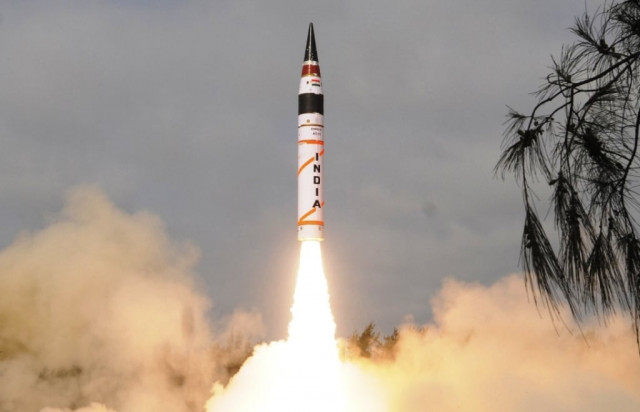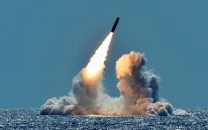Indian missile pride hides strategic flaws: Analysts
India's pride at the successful test of a long-range missile hides weaknesses in strategic military planning.

Indian missile pride hides strategic flaws: Analysts
Thursday's launch of the Agni V, which has a range of 5,000 kilometres and can carry a one-tonne nuclear payload, triggered a round of intense, patriotic self-congratulation.
"This launch has given a message to the entire world that India has the capability to design, develop, build and manufacture missiles of this class," said VK Saraswat, head of the state-run Defence Research and Development Organisation.
"We are today a missile power," Saraswat announced.
The sense of achievement was not unfounded.
The Agni V is more than 80% indigenously developed, and with a range extending across the whole of China and beyond, it holds the potential to significantly upgrade India's military deterrent.
"It has been termed a game changer, and in many ways it is a game changer. It covers the whole of China which was not the case before," said strategic missile expert PK Ghosh.
But while acknowledging the technological achievement, a number of analysts noted it was just a tiny step towards achieving any military parity with its giant regional rival.
"We are still way behind China. In terms of missile numbers, range and quality, they are way ahead of us," said C Raja Mohan, a security analyst and senior fellow at the Center for Policy Research, a policy think-tank in Delhi.
Mohan also argued that there was too much focus on "demonstration" launches, which only proved that India's missile policy was led by the scientific community rather than the government and military bureaucracy.
"We can all wrap ourselves in the flag today, but there's a dearth of real strategy on how to actually deploy missile technology," he said.
The Agni V remains some way from actually being inducted into the armed forces.
Experts said it would require four or five more tests to confirm its flight path, accuracy and overall competence, before production could actually begin.
Rahul Bedi, a consultant with global security analysts IHS Jane's, said India's political leadership had failed to capitalise on the technological breakthroughs of its scientists.
"India's nuclear deterrence lacks political foresight and understanding of its employment primarily because of the politicians' limited understanding of strategic matters," Bedi said.
"The euphoria over Agni V's success will abate fast if not followed by firming up this dissuasive deterrence capability that has only been demonstrated today, not confirmed," he added.
Agni, which means "fire" in Sanskrit, is the name given to a series of rockets India developed as part of its ambitious integrated guided missile development project launched in 1983.
While the shorter-range Agnis I and II were mainly developed with traditional rival Pakistan in mind, later versions with a range of 3,500 kilometres are perceived as China-centric deterrents.
India and China, each with a population of more than one billion, have prickly relations and a legacy of mistrust that stems from a brief but bloody border war in 1962.
The Chinese foreign ministry said Thursday it had taken note of the Agni launch, and downplayed any sense of rivalry between the neighbours.
"China and India are both big emerging countries. We are not rivals but cooperation partners," foreign ministry spokesman Liu Weimin told reporters.
After the successful test, much was made of the fact that the Agni V could eventually push India into the league of countries with intercontinental ballistic missiles (ICBMs).
But K Santhanam, one of the military scientists behind India's 1998 nuclear tests, questioned the strategic motivation behind extending the country's missile strike range even further.
"The Agni V has strategic relevance, but how far do you want to go? Do you want to go to Washington DC?," Santhanam told AFP.
"We don't need ICBMs because we are at most a regional power and they wouldn't fit into any coherent strategy given the current security scenario," he added.



















COMMENTS
Comments are moderated and generally will be posted if they are on-topic and not abusive.
For more information, please see our Comments FAQ